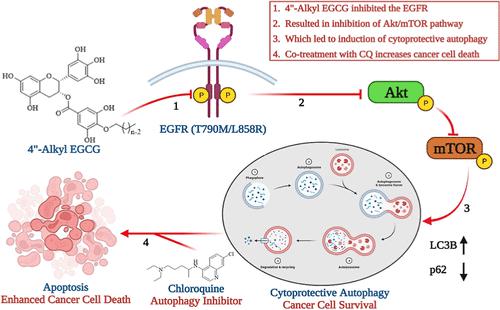Our official English website, www.x-mol.net, welcomes your
feedback! (Note: you will need to create a separate account there.)
4″-Alkyl EGCG Derivatives Induce Cytoprotective Autophagy Response by Inhibiting EGFR in Glioblastoma Cells
ACS Omega ( IF 3.7 ) Pub Date : 2024-01-03 , DOI: 10.1021/acsomega.3c06110 Satyam Singh 1 , Priya Ghosh 1 , Rajarshi Roy 1 , Ananyaashree Behera 2 , Revathy Sahadevan 3 , Parimal Kar 1 , Sushabhan Sadhukhan 3 , Avinash Sonawane 1
ACS Omega ( IF 3.7 ) Pub Date : 2024-01-03 , DOI: 10.1021/acsomega.3c06110 Satyam Singh 1 , Priya Ghosh 1 , Rajarshi Roy 1 , Ananyaashree Behera 2 , Revathy Sahadevan 3 , Parimal Kar 1 , Sushabhan Sadhukhan 3 , Avinash Sonawane 1
Affiliation

|
Epidermal growth factor receptor (EGFR)-targeted therapy has been proven vital in the last two decades for the treatment of multiple cancer types, including nonsmall cell lung cancer, glioblastoma, breast cancer and head and neck squamous cell carcinoma. Unfortunately, the majority of approved EGFR inhibitors fall into the drug resistance category because of continuous mutations and acquired resistance. Recently, autophagy has surfaced as one of the emerging underlying mechanisms behind resistance to EGFR-tyrosine kinase inhibitors (TKIs). Previously, we developed a series of 4″-alkyl EGCG (4″-Cn EGCG, n = 6, 8, 10, 12, 14, 16, and 18) derivatives with enhanced anticancer effects and stability. Therefore, the current study hypothesized that 4″-alkyl EGCG might induce cytoprotective autophagy upon EGFR inhibition, and inhibition of autophagy may lead to improved cytotoxicity. In this study, we have observed growth inhibition and caspase-3-dependent apoptosis in 4″-alkyl EGCG derivative-treated glioblastoma cells (U87-MG). We also confirmed that 4″-alkyl EGCG could inhibit EGFR in the cells, as well as mutant L858R/T790M EGFR, through an in vitro kinase assay. Furthermore, we have found that EGFR inhibition with 4″-alkyl EGCG induces cytoprotective autophagic responses, accompanied by the blockage of the AKT/mTOR signaling pathway. In addition, cytotoxicity caused by 4″-C10 EGCG, 4″-C12 EGCG, and 4″-C14 EGCG was significantly increased after the inhibition of autophagy by the pharmacological inhibitor chloroquine. These findings enhance our understanding of the autophagic response toward EGFR inhibitors in glioblastoma cells and suggest a potent combinatorial strategy to increase the therapeutic effectiveness of EGFR-TKIs.
中文翻译:

4″-烷基 EGCG 衍生物通过抑制胶质母细胞瘤细胞中的 EGFR 诱导细胞保护性自噬反应
过去二十年来,表皮生长因子受体(EGFR)靶向治疗已被证明对于治疗多种癌症类型至关重要,包括非小细胞肺癌、胶质母细胞瘤、乳腺癌和头颈鳞状细胞癌。不幸的是,由于持续突变和获得性耐药,大多数已批准的 EGFR 抑制剂都属于耐药类别。最近,自噬已成为 EGFR 酪氨酸激酶抑制剂 (TKI) 耐药性背后的新兴潜在机制之一。此前,我们开发了一系列具有增强抗癌作用和稳定性的4″-烷基EGCG(4″-C n EGCG, n = 6、8、10、12、14、16和18)衍生物。因此,目前的研究假设4'-烷基EGCG可能在EGFR抑制后诱导细胞保护性自噬,而自噬的抑制可能导致细胞毒性的改善。在这项研究中,我们观察到 4'-烷基 EGCG 衍生物处理的胶质母细胞瘤细胞 (U87-MG) 的生长抑制和 caspase-3 依赖性细胞凋亡。我们还通过体外激酶测定证实,4'-烷基 EGCG 可以抑制细胞中的 EGFR,以及突变型 L858R/T790M EGFR。此外,我们发现用 4'-烷基 EGCG 抑制 EGFR 会诱导细胞保护性自噬反应,并伴有 AKT/mTOR 信号通路的阻断。此外,药理抑制剂氯喹抑制自噬后,4”-C 10 EGCG、4”-C 12 EGCG、4”-C 14 EGCG引起的细胞毒性显着增强。 这些发现增强了我们对胶质母细胞瘤细胞对 EGFR 抑制剂自噬反应的理解,并提出了一种有效的组合策略来提高 EGFR-TKI 的治疗效果。
更新日期:2024-01-03
中文翻译:

4″-烷基 EGCG 衍生物通过抑制胶质母细胞瘤细胞中的 EGFR 诱导细胞保护性自噬反应
过去二十年来,表皮生长因子受体(EGFR)靶向治疗已被证明对于治疗多种癌症类型至关重要,包括非小细胞肺癌、胶质母细胞瘤、乳腺癌和头颈鳞状细胞癌。不幸的是,由于持续突变和获得性耐药,大多数已批准的 EGFR 抑制剂都属于耐药类别。最近,自噬已成为 EGFR 酪氨酸激酶抑制剂 (TKI) 耐药性背后的新兴潜在机制之一。此前,我们开发了一系列具有增强抗癌作用和稳定性的4″-烷基EGCG(4″-C n EGCG, n = 6、8、10、12、14、16和18)衍生物。因此,目前的研究假设4'-烷基EGCG可能在EGFR抑制后诱导细胞保护性自噬,而自噬的抑制可能导致细胞毒性的改善。在这项研究中,我们观察到 4'-烷基 EGCG 衍生物处理的胶质母细胞瘤细胞 (U87-MG) 的生长抑制和 caspase-3 依赖性细胞凋亡。我们还通过体外激酶测定证实,4'-烷基 EGCG 可以抑制细胞中的 EGFR,以及突变型 L858R/T790M EGFR。此外,我们发现用 4'-烷基 EGCG 抑制 EGFR 会诱导细胞保护性自噬反应,并伴有 AKT/mTOR 信号通路的阻断。此外,药理抑制剂氯喹抑制自噬后,4”-C 10 EGCG、4”-C 12 EGCG、4”-C 14 EGCG引起的细胞毒性显着增强。 这些发现增强了我们对胶质母细胞瘤细胞对 EGFR 抑制剂自噬反应的理解,并提出了一种有效的组合策略来提高 EGFR-TKI 的治疗效果。













































 京公网安备 11010802027423号
京公网安备 11010802027423号